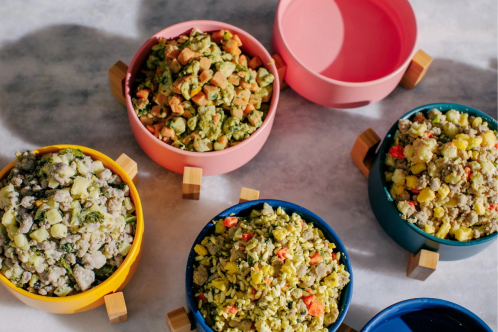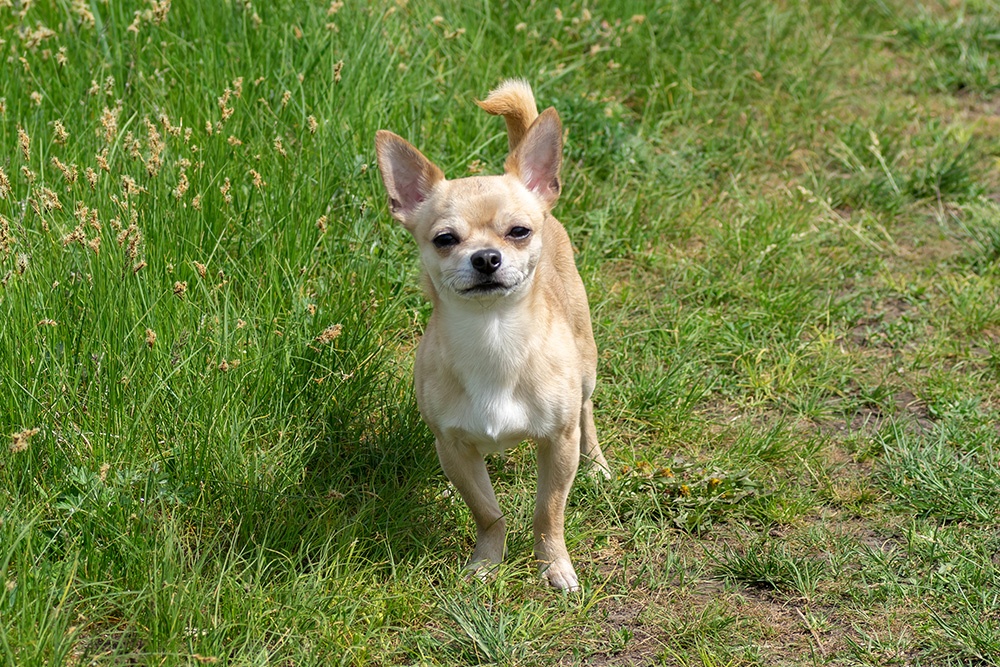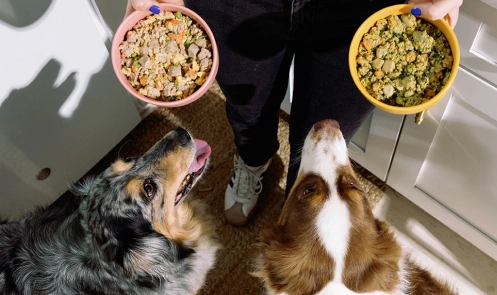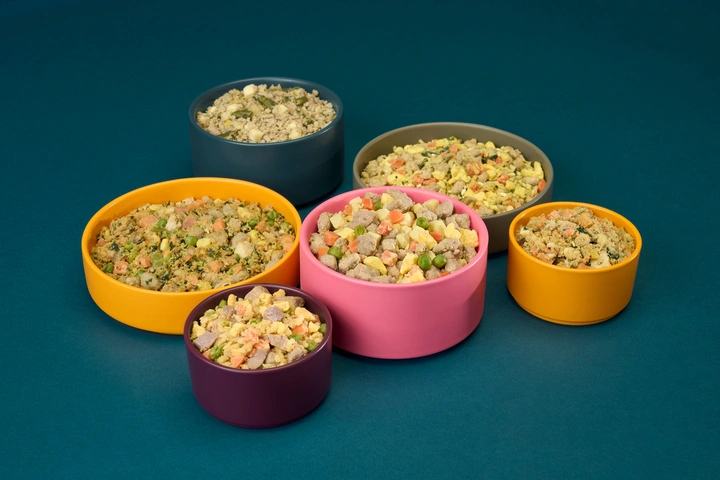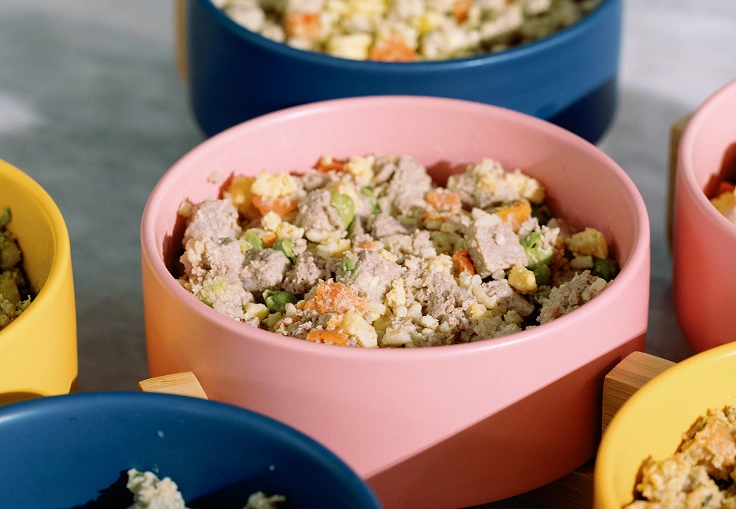The Chihuahua is a small sized dog with a larger-than-life personality. This energetic, fun-loving companion enjoys both outdoor activities and accompanying his pet parent everywhere and anywhere. Chihuahuas often develop strong bonds with their families but can become demanding if they are spoiled. Intelligent, bold, and quick to learn, the chihuahua is as impressive on the agility field as he is a watchdog for his home. However, that dominant personality can lose some of its shine if your chihuahua develops skin and food allergies, an unfortunate condition that often impacts this dog breed.
Chihuahua Coat Characteristics
The Chihuahua breed can have either long or smooth coats. Long-coated Chihuahuas have soft fur that is either slightly curly or entirely flat; the tail is plumed and full, and the ears have fringes of hair. Feathering on the feet, a ruff on the neck, long hair on the stomach (frill), and long hair on the hind legs are also prominent features of the long-coated Chihuahua. The smooth-coated dog has fur that fits close to the body with a ruff of longer, thicker hair around the neck. The tail is furry, and the hairs on the head and ears are thin.
There are no heavy grooming requirements for the Chihuahua; weekly brushing with a grooming mitt for the smooth-haired Chihuahua and a pin brush for the long-haired version will help remove loose or dead hair. This breed is not a heavy shedder, although seasonal changes can bring on some loose clumps and strands.
Susceptibility to Skin Allergies
The Chihuahua breed is highly susceptible to skin allergies, and the causes can range from genetic to environmental to food intolerances. Chihuahuas are prone to developing external genetic skin conditions such as sebaceous adenitis, a disease where the antibodies attack and permanently damage the dog’s skin glands, and yeast infections, which happen when the normal amount of yeast on the Chihuahua’s skin begins to overproduce, resulting in an imbalance and an infection. Fleas and pollen grains are other common external allergies that can lead to skin irritation, itching, and illness.
Food allergies are relatively prominent in Chihuahuas, and these internal allergies can be triggered once a dog has ingested the allergen. Chihuahuas are highly sensitive to food allergies and intolerances; often the symptoms of a food allergy are chronic ear infections, vomiting, diarrhea, and red, inflamed, and flaky skin. Hair loss and a dull, dry coat are also symptoms of food allergies in the Chihuahua breed.
Common Allergy Locations on the Chihuahua
Like other breeds, Chihuahuas have both general and specific locations where allergies tend to manifest. Allergies can cause reactions on a Chihuahua’s legs, paws, and hind end, as well as the within the folds of skin around the neck and armpits. In these cases, you may notice your Chihuahua scratching, biting, or frequently chewing on these areas of the body.
Chihuahuas are also susceptible to alopecia and demodectic mite allergies. These medical conditions are often accompanied by symptoms of scaling and crusting, usually upon the head, ventral parts of the chest, legs, neck, and eyes.
Causes of Skin Allergies
Chihuahuas are prone to genetic, environmental, or food allergies that often result in poor skin conditions. Sometimes, puppies are exposed to allergens early in life, causing a genetic predisposition to atopic dermatitis to occur. Environmental factors, such as tree pollens, molds, grasses, or dust mites, may also be responsible for Chihuahua skin allergies. Genetic and environmental reactions often take the form of chronic itchiness, hair loss, and hot spots.
Food allergies are a particular concern with the Chihuahua breed. Some dogs suffer from the immune system’s misidentification of a food protein as a danger to the body, and an immune response begins. While responses can include gastrointestinal distress, most dogs with a food allergy have symptoms that appear on the skin. A veterinarian or a board-certified veterinary nutritionist can help determine whether your Chihuahua has food allergies through diagnosis and diet elimination procedures.
Treatment Options
On the surface, you can give your Chihuahua some immediate and topical relief from itchy skin. Using an organic shampoo that is free of sulfates and chemicals; cleansers that are hypoallergenic and that contain soothing nutrients such as bentonite clay and aloe vera can calm the inflamed, reddened skin. Stubborn hot spot outbreaks can be managed with an organic spray. Extreme cases of allergies may require medications like antihistamines and corticosteroids, as well as immunotherapy.
For food allergies, consulting with a veterinarian, board-certified veterinary nutritionist, or allergist is the first step toward diagnosing a food allergy and devising a dietary plan that works best for your Chihuahua. Adding fatty acids or fatty acid supplements to your Chihuahua’s diet, such as fish oil, may help reduce inflammation or stop the allergic reaction altogether. It is important to note that any changes to your dog’s diet must be entered into slowly and carefully to prevent stomach upset.
If you think your Chihuahua has a food allergy, follow these steps to try an elimination diet or food trial.
- Feed your dog a completely new diet that is composed of a generally pure food for a minimum of eight weeks. For the most accurate results, feed your dog a simple ingredient, non-contaminated diet for the entire trial.
- The elimination diet may be commercially produced or cooked. Choose a food with single sources of animal and vegetable proteins, and carbohydrate calories found in rabbit and peas or potato and fish. Steer clear of foods with natural flavors as they may contain unidentified proteins that could skew the trial results.
- Avoid feeding your Chihuahua any table food, treats, flavored medications, or supplements during the elimination diet.
After eight weeks, carefully reintroduce specific dietary ingredients and watch for an allergic reaction in your dog.
An inexpensive probiotic supplement can improve more than your dog’s gastrointestinal system; probiotics strengthen the immune system by fighting and reducing allergic inflammation. Probiotics for dogs are another means by which you can control and perhaps eliminate your Chihuahua’s food allergies.
Key Ingredients to Fight Allergies
One way to tackle food allergies is through a fresh food diet. Often, the fresh food approach is the answer for dogs suffering from itchiness and discomfort caused by allergens. Diets that have fatty acids (Omega-3 and Omega-6), amino acids, and healthy fats are best for eliminating itchiness and dry, scaly, flaky skin. Some excellent fatty acid sources to look for in fresh foods are blackcurrant seed oil, sunflower oil, and fish oil. Additionally, zinc and B-vitamin complexes are excellent ingredients to help your Chihuahua manage his food allergy.
The following chart offers suggestions for handling the types of allergic reactions that Chihuahuas may develop:
| Condition | Dietary Needs and Adjustments |
|---|---|
| Coat Color Changes | Increase amino acids which can be found in protein (>75 grams per 1000 calories); use our calculator to convert a label percentage to the caloric basis (grams per 1000 calories) |
| Concurrent GI Signs | Avoid foods with tryptamine and histamine such as dairy or fermented vegetables and meats (yes, this includes bacon); try a simple ingredient food trial |
| Chronic Itching and Dermatitis | Fortify the diet with Vitamin E, B Vitamins, Zinc, and omega-6 and omega-3 fatty acids found in fish oil; add a probiotic; try a simple ingredient food trial |
| Dull Coat and Scaling | Adjust EPA and DHA levels in the diet; try a food that has added zinc |
| Dandruff and Crustiness | Add Zinc and Vitamin A levels |
How Fresh Food Can Help
Real ingredients, including foods with identifiable ingredients, as well as higher amounts of antioxidants and fatty acids, are what can be found in a fresh food diet. Your Chihuahua’s diet is critically important to his daily wellbeing and overall health. Although commercial kibble has a longer shelf life and is more affordable short-term, it does not use the same wholesome ingredients found in a fresh food diet. That is why fresh food delivered in an individually-portioned diet is ideal for the Chihuahua, especially food that keeps your Chihuahua lean and less prone to inflammation.
As previously mentioned, the right fresh food will include essential fatty acids such as those listed above. Certain vitamins, minerals, and fatty acids will keep your Chihuahua’s coat and skin healthy, resulting in a stronger immune system and fewer flare-ups. Custom, limited-ingredient fresh food recipes will reduce your Chihuahua’s exposure to food allergens in his diet.
About Nom Nom
Your Chihuahua would benefit from portioned, cooked, and inspected fresh dog foods perfect for canines with food allergies. The fresh food recipes that Nom Nom creates are custom-made with high-quality ingredients and full of the purity and quality your Chihuahua needs to stay healthy and allergy-free.
Every serving of our food includes the Nutrient Mix, an extra burst of vital minerals and vitamins that give your Chihuahua the balanced nutrition he needs to maintain skin and coat health. Vitamins A and E protect the surface of the skin while zinc and selenium.
References
1. Dodds, W. Guide to Congenital and Heritable Disorders in Dogs. Humane Society Veterinary Medical Association (2011).
2. Rosser, EJ. Diagnosis of Food Allergy in Dogs. J Am Vet Med Assoc., 203 (2), 259-262 (1993).
3. Harvey, R., Hall, E. Dietary/allergy intolerance. Veterinary Focus, 19 (1), 36 - 41 (2009).
4. Chen, C. A Short‐tailed Demodectic Mite and Demodex canis Infestation in a Chihuahua Dog. Veterinary Dermatology (1995). doi.org/10.1111/j.1365-3164.1995.tb00069.x
5. Sousa, C., Marsella, R. The ACVD task force on canine atopic dermatitis (II): genetic factors. Veterinary Immunology and Immunopathology, 81 (3-4), 153 - 157 (2001).
6. Olivry, T., Mueller, R., Prelaud, P. Critically appraised topic on adverse food reactions of companion animals (1): duration of elimination diets. BMC Veterinary Research, 11 (225) (2015).
